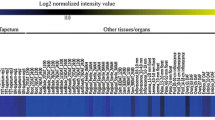Abstract
The MADS domain proteins AP1, AP3, PI, and AG are required to specify the four classes of organs in an Arabidopsis flower. Each of these proteins is involved in specifying the identity of two different organs in two adjacent floral whorls. They all share a 56-amino acid MADS domain required for DNA binding and dimerization, a region (I or L) involved in dimerization specificity, the K domain named for its sequence similarity to the coiled-coil of keratin, and a variable carboxy terminal sequence. The abilities of these four related proteins to specify distinct organs presumably result from differential effects on transcriptional regulation. We have previously used chimeric MADS box genes, expressed under the constitutive 35S promoter, to map the regions of these proteins that are responsible for their different organ identity activities. In this paper, we extend these studies by characterizing the phenotypes of plants ectopically expressing chimeric genes under the control of the endogenous AP1 promoter. Similar results are obtained with the 35S and AP1 promoters, although the endogenous promoter does provide a more rigorous test of function. We also describe results from new chimeric gene constructs that show new in vivo functions for the K domain and the amino-terminal portion of the MADS domain.
Similar content being viewed by others
Author information
Authors and Affiliations
Additional information
Received: 17 December 1998 / Revision accepted: 12 January 1999
Rights and permissions
About this article
Cite this article
Krizek, B., Riechmann, J. & Meyerowitz, E. Use of the APETALA1 promoter to assay the in vivo function of chimeric MADS box genes. Sex Plant Reprod 12, 14–26 (1999). https://doi.org/10.1007/s004970050167
Issue Date:
DOI: https://doi.org/10.1007/s004970050167




